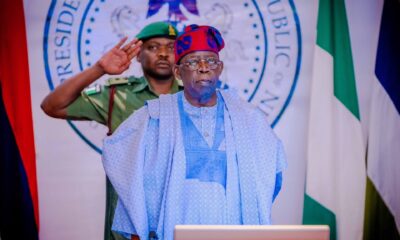Editorial
That Panacea For Herdsmen/Farmers Clashes
The Federal Government may have come
up with a plan to address the incessant
clashes between herdsmen and farmers, but the last may not have been heard about the excesses of the Fulani herdsmen in Nigeria.
Governor of Plateau State, Simon Lalong told newsmen recently that President Muhammadu Buhari and State Governors have agreed to establish ranches for cattle rearers to keep and feed their animals in one place.
According to him, government would provide facilities like health centres, schools and other basic needs in the ranches. But when and where the ranches would be built was not stated. Also not addressed yet is the mode of moving cattle in Nigeria.
While we want to commend the Federal Government for finally coming up with an idea that is capable of addressing the problem, it must be noted that this is not one of those things that should wait for years, even months to be implemented.
The herdsmen/farmer clashes have become a major threat to peace and national unity. Indeed, recent slant to the conflict has attracted more attention, even that of persons agitating for the State of Biafra. In fact, the Igbo group has threatened to take up the matter if the Federal Government fails to do something about it soonest.
It is bad enough that successive regimes failed to address the problem, and allowed the avoidable loss of lives and property, but that the herdsmen now use sophisticated weapons like AK47 and suffer no conscience as they burn down whole villages and even hoist Islamic flags is terrible.
The clashes which became more frequent and daring since the election of a Fulani as President of Nigeria has also raised more concerns because till date, the Federal Government has not openly condemned the excesses of the herdsmen nor prosecuted them, nor taken steps to remove guns from them.
If the truth must be told, it is the Fulani herdsmen that are the aggressors in this matter. They are the ones that trespass on the land of other persons and allow their cattle to destroy whole farms. When confronted they are also the ones that are quick to kill. Before now, it was with bow and arrow, dagger and sticks, now, it is with automatic riffles.
Giving these facts, the Federal Government has not, until now, charged anyone for trespass, nor has any land owner been compensated for damaged crops or lost lives. Never has government done anything to direct the herdsmen away from possible areas of conflict.
Incidentally, the herdsmen have had clashes in nearly all the States on their path to the South. Only recently, deadly clashes were also recorded in Ahoada and Etche areas of Rivers State. We think that enough is enough. It is almost becoming imperative for farmers to defend themselves anyhow they know. But where would that take this country.
That is why the idea of building ranches should be put to work immediately. With the level of crisis in Nigeria and the rising intolerance in the polity everything should be done to avoid the herdsmen/farmers clashes. Meanwhile, persons affected should be assisted in some ways.
Clearly, the idea of ranches is not a new one. In the developed world nobody allows his animals to stray, talk less of destroying farms. In those economies, government will not take it lightly that persons are killed because of the grazing needs of cattle. That is why the acceptance of the ranch idea is a milestone.
Even so, laws must be put in place to regulate the activities of herdsmen. Since the ranches will be located across the country it will at least address an aspect of the problem. Government must also decide that cattle can only be moved by trailer, train or any other vessels.
This is important because except government will also build abattoirs in every ranch, where the cattle will be prepared for the market moving them to abattoirs will also constitute a problem. In fact, except on special request, there will be no need to move live animals, since the animals can be killed, dressed and transported in coldrooms.
As a matter of fact, a lot can be saved if the Federal Government would consider moving meat in coldrooms. This they can facilitate by providing standard abattoirs and coldroom facilities in some northern states. Such facilities should be self sustaining with the fees collected.
While we expect the Federal Government to come out with a progressive way of dealing with this matter, we hope that steps will be taken to forestall further clashes. It must be clear that nobody is above the law and anyone that violates the rights of another should be made to pay.
Editorial
HYPREP And The Collapsed Water Tank

Editorial
Resurgence Of Illegal Structures In PH
Editorial
Certificate Forgery, Loss Of Public Trust

-

 Featured5 days ago
Featured5 days agoOil & Gas: Rivers Remains The Best Investment Destination – Fubara
-

 News5 days ago
News5 days agoInvestment In Education Remains Top Priority For Gov Fubara – SSG
-

 News5 days ago
News5 days agoChina Alerts Rivers, A’Ibom, Abia Govs To Economic Triangle
-

 Featured5 days ago
Featured5 days agoLady Fubara Lauds Rivers Women On Peace, Development
-

 News5 days ago
News5 days agoTinubu Nominates Ex-INEC Chair Yakubu, Fani-Kayode, Omokri, 29 Others As Ambassadors
-
News5 days ago
Fubara Seeks Media Support Towards Rivers Dev …Commends National Network For Vibrancy
-
Business1 day ago
Shippers Council Vows Commitment To Security At Nigerian Ports
-

 Business1 day ago
Business1 day agoNigeria Risks Talents Exodus In Oil And Gas Sector – PENGASSAN

